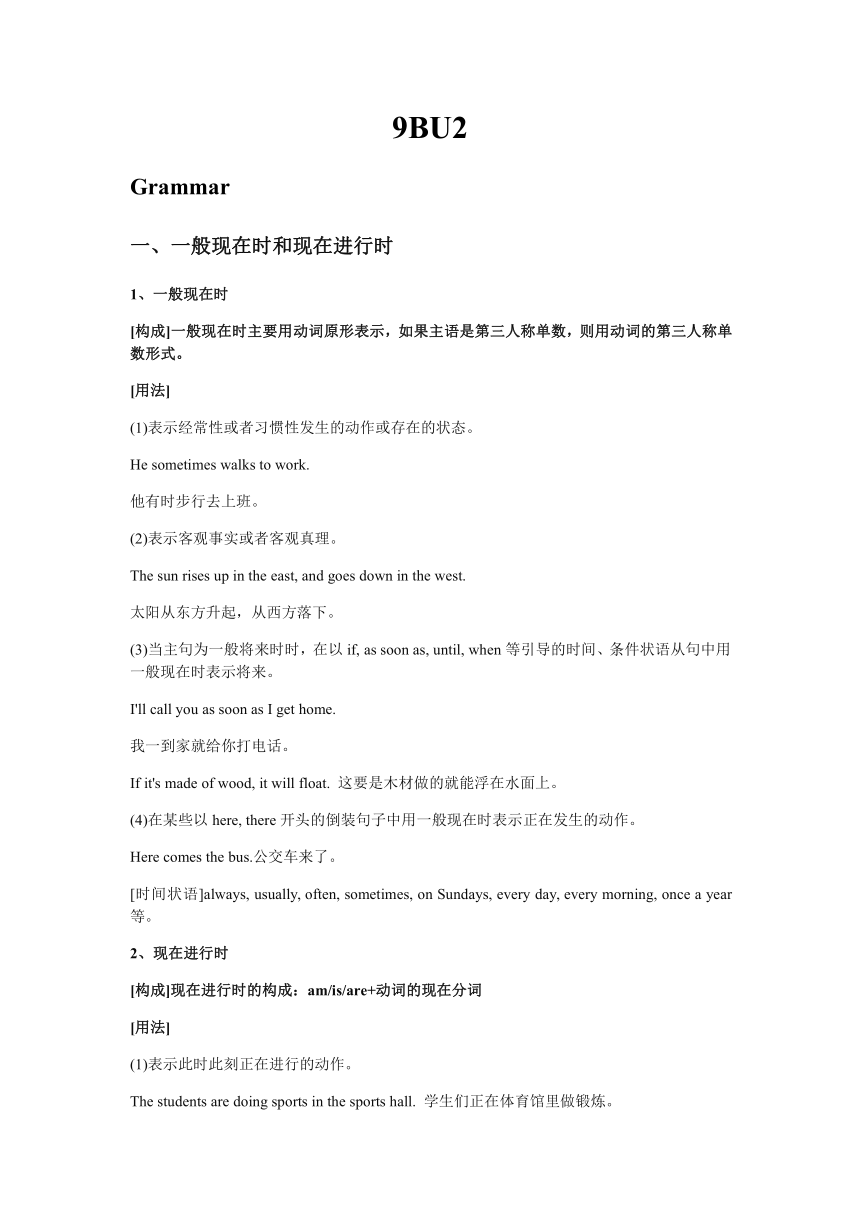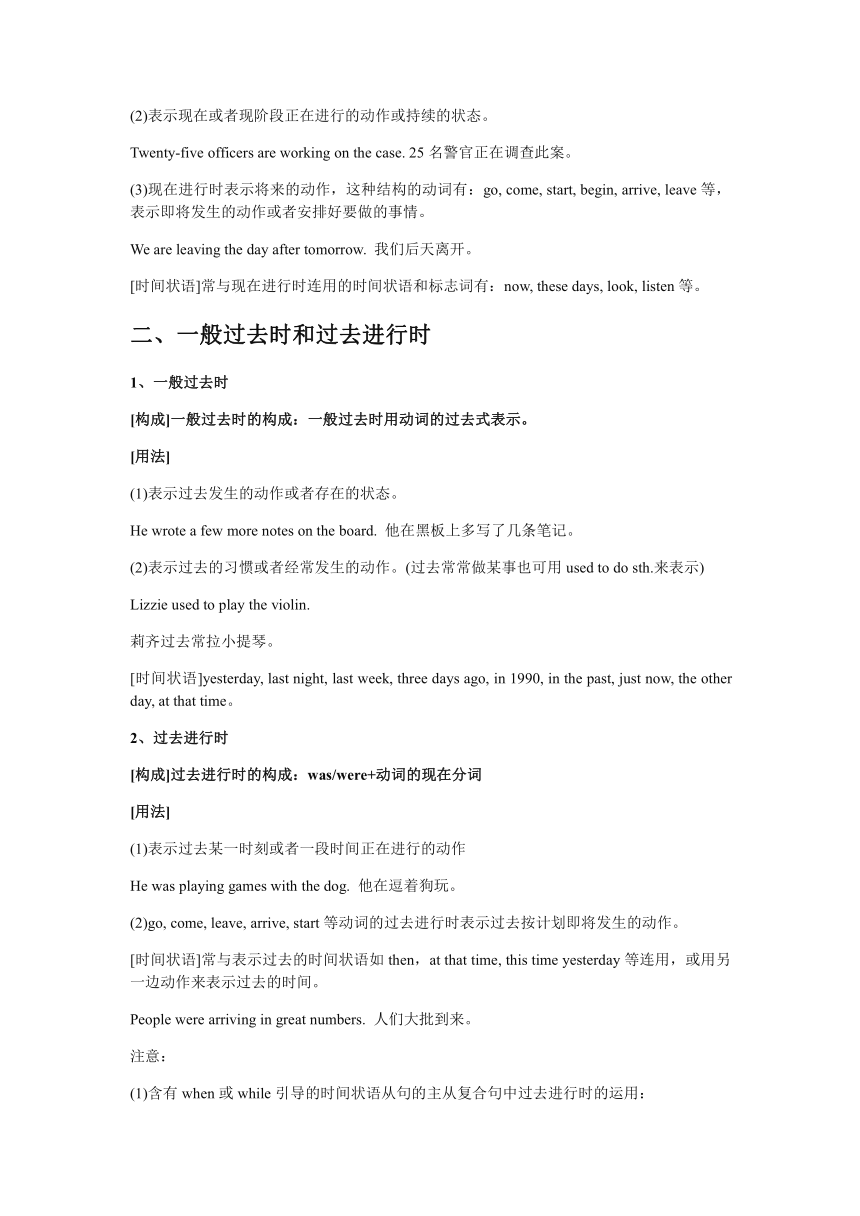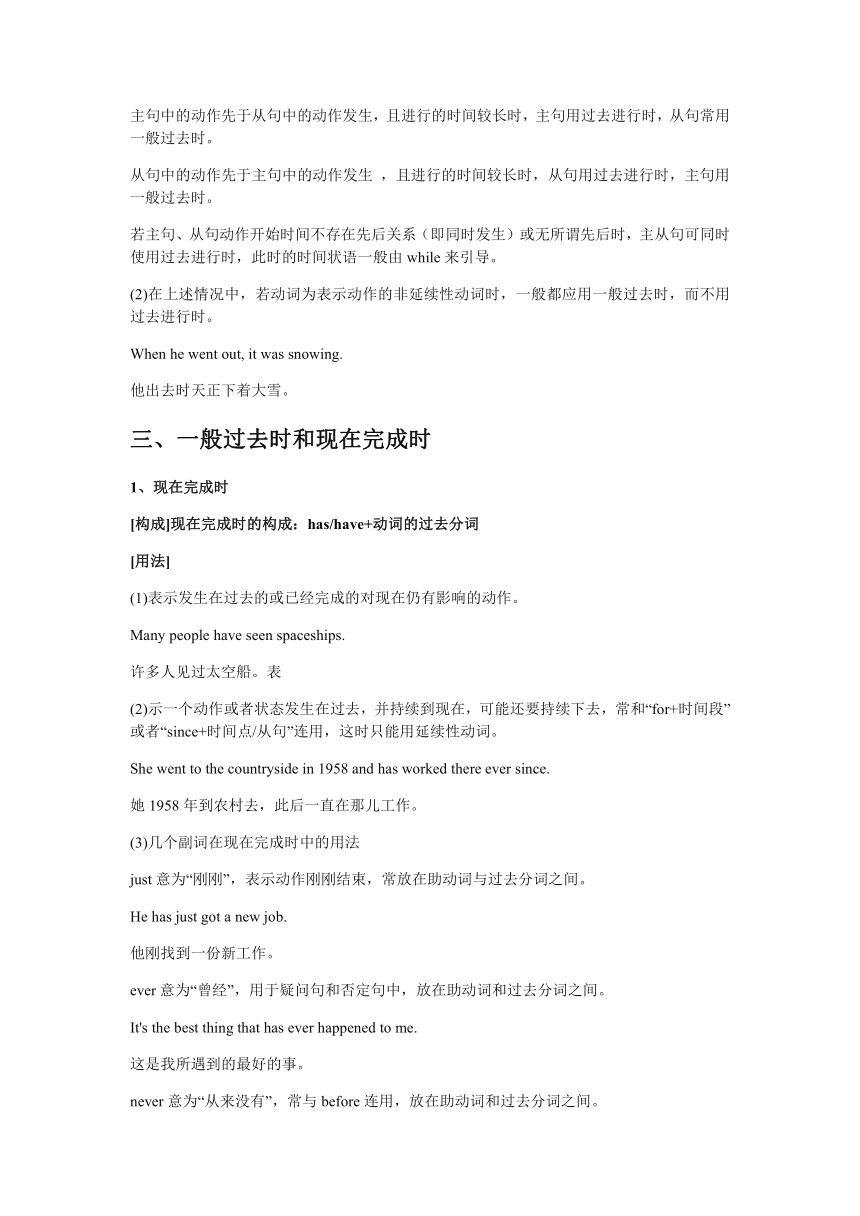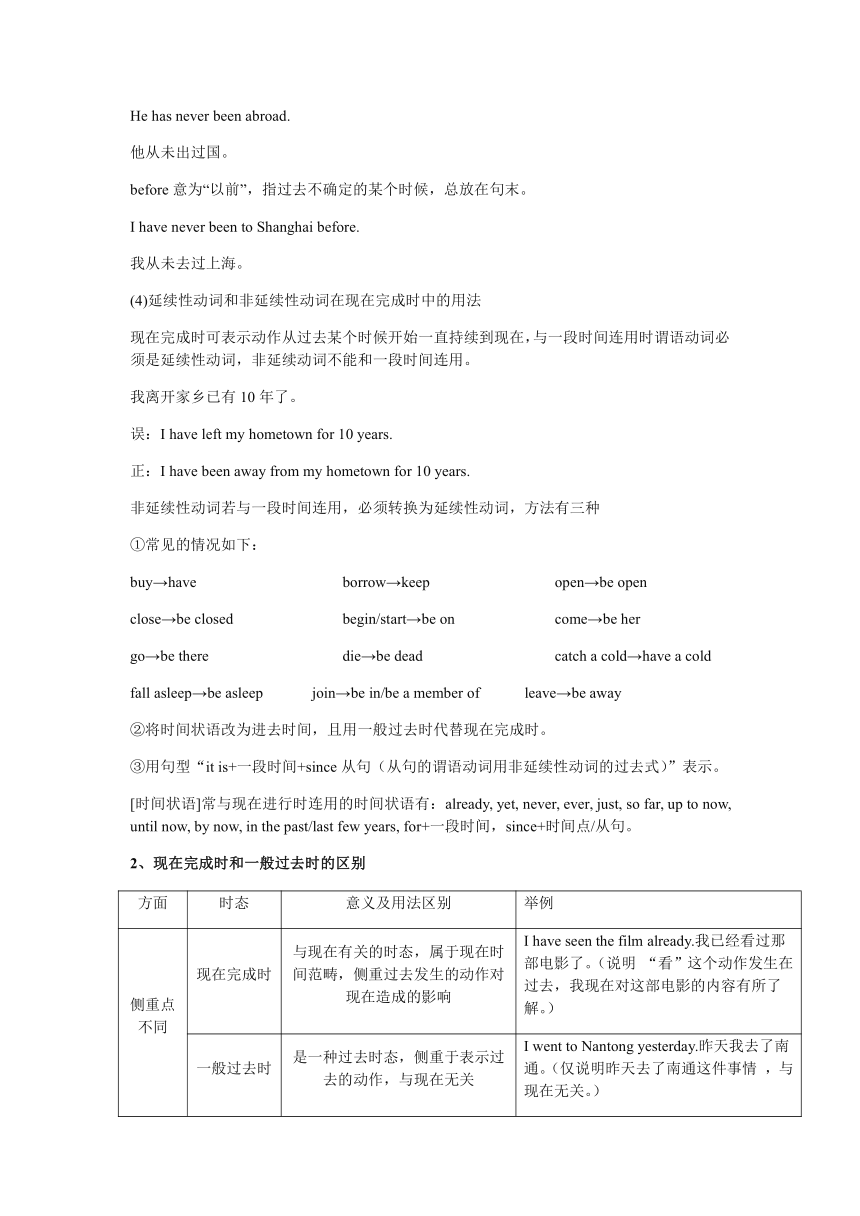Unit 2 Great people Grammar 知识点整理及练习 牛津译林版英语九年级下册(含答案)
文档属性
| 名称 | Unit 2 Great people Grammar 知识点整理及练习 牛津译林版英语九年级下册(含答案) |  | |
| 格式 | docx | ||
| 文件大小 | 30.5KB | ||
| 资源类型 | 教案 | ||
| 版本资源 | 牛津译林版 | ||
| 科目 | 英语 | ||
| 更新时间 | 2021-01-26 15:10:11 | ||
图片预览




文档简介
9BU2
Grammar
一般现在时和现在进行时
一般现在时
[构成]一般现在时主要用动词原形表示,如果主语是第三人称单数,则用动词的第三人称单数形式。
[用法]
(1)表示经常性或者习惯性发生的动作或存在的状态。
He sometimes walks to work.
他有时步行去上班。
(2)表示客观事实或者客观真理。
The sun rises up in the east, and goes down in the west.
太阳从东方升起,从西方落下。
(3)当主句为一般将来时时,在以if, as soon as, until, when等引导的时间、条件状语从句中用一般现在时表示将来。
I'll call you as soon as I get home.
我一到家就给你打电话。
If it's made of wood, it will float. 这要是木材做的就能浮在水面上。
(4)在某些以here, there开头的倒装句子中用一般现在时表示正在发生的动作。
Here comes the bus.公交车来了。
[时间状语]always, usually, often, sometimes, on Sundays, every day, every morning, once a year等。
2、现在进行时
[构成]现在进行时的构成:am/is/are+动词的现在分词
[用法]
(1)表示此时此刻正在进行的动作。
The students are doing sports in the sports hall. 学生们正在体育馆里做锻炼。
(2)表示现在或者现阶段正在进行的动作或持续的状态。
Twenty-five officers are working on the case. 25名警官正在调查此案。
(3)现在进行时表示将来的动作,这种结构的动词有:go, come, start, begin, arrive, leave等,表示即将发生的动作或者安排好要做的事情。
We are leaving the day after tomorrow. 我们后天离开。
[时间状语]常与现在进行时连用的时间状语和标志词有:now, these days, look, listen等。
一般过去时和过去进行时
1、一般过去时
[构成]一般过去时的构成:一般过去时用动词的过去式表示。
[用法]
(1)表示过去发生的动作或者存在的状态。
He wrote a few more notes on the board. 他在黑板上多写了几条笔记。
(2)表示过去的习惯或者经常发生的动作。(过去常常做某事也可用used to do sth.来表示)
Lizzie used to play the violin.
莉齐过去常拉小提琴。
[时间状语]yesterday, last night, last week, three days ago, in 1990, in the past, just now, the other day, at that time。
2、过去进行时
[构成]过去进行时的构成:was/were+动词的现在分词
[用法]
(1)表示过去某一时刻或者一段时间正在进行的动作
He was playing games with the dog. 他在逗着狗玩。
(2)go, come, leave, arrive, start等动词的过去进行时表示过去按计划即将发生的动作。
[时间状语]常与表示过去的时间状语如then,at that time, this time yesterday等连用,或用另一边动作来表示过去的时间。
People were arriving in great numbers. 人们大批到来。
注意:
(1)含有when或while引导的时间状语从句的主从复合句中过去进行时的运用:
主句中的动作先于从句中的动作发生,且进行的时间较长时,主句用过去进行时,从句常用一般过去时。
从句中的动作先于主句中的动作发生 ,且进行的时间较长时,从句用过去进行时,主句用一般过去时。
若主句、从句动作开始时间不存在先后关系(即同时发生)或无所谓先后时,主从句可同时使用过去进行时,此时的时间状语一般由while来引导。
(2)在上述情况中,若动词为表示动作的非延续性动词时,一般都应用一般过去时,而不用过去进行时。
When he went out, it was snowing.
他出去时天正下着大雪。
一般过去时和现在完成时
1、现在完成时
[构成]现在完成时的构成:has/have+动词的过去分词
[用法]
(1)表示发生在过去的或已经完成的对现在仍有影响的动作。
Many people have seen spaceships.
许多人见过太空船。表
(2)示一个动作或者状态发生在过去,并持续到现在,可能还要持续下去,常和“for+时间段”或者“since+时间点/从句”连用,这时只能用延续性动词。
She went to the countryside in 1958 and has worked there ever since.
她1958年到农村去,此后一直在那儿工作。
(3)几个副词在现在完成时中的用法
just意为“刚刚”,表示动作刚刚结束,常放在助动词与过去分词之间。
He has just got a new job.
他刚找到一份新工作。
ever意为“曾经”,用于疑问句和否定句中,放在助动词和过去分词之间。
It's the best thing that has ever happened to me.
这是我所遇到的最好的事。
never意为“从来没有”,常与before连用,放在助动词和过去分词之间。
He has never been abroad.
他从未出过国。
before意为“以前”,指过去不确定的某个时候,总放在句末。
I have never been to Shanghai before.
我从未去过上海。
(4)延续性动词和非延续性动词在现在完成时中的用法
现在完成时可表示动作从过去某个时候开始一直持续到现在,与一段时间连用时谓语动词必须是延续性动词,非延续动词不能和一段时间连用。
我离开家乡已有10年了。
误:I have left my hometown for 10 years.
正:I have been away from my hometown for 10 years.
非延续性动词若与一段时间连用,必须转换为延续性动词,方法有三种
①常见的情况如下:
buy→have borrow→keep open→be open
close→be closed begin/start→be on come→be her
go→be there die→be dead catch a cold→have a cold
fall asleep→be asleep join→be in/be a member of leave→be away
②将时间状语改为进去时间,且用一般过去时代替现在完成时。
③用句型“it is+一段时间+since从句(从句的谓语动词用非延续性动词的过去式)”表示。
[时间状语]常与现在进行时连用的时间状语有:already, yet, never, ever, just, so far, up to now, until now, by now, in the past/last few years, for+一段时间,since+时间点/从句。
2、现在完成时和一般过去时的区别
方面
时态
意义及用法区别
举例
侧重点不同
现在完成时
与现在有关的时态,属于现在时间范畴,侧重过去发生的动作对现在造成的影响
I have seen the film already.我已经看过那部电影了。(说明 “看”这个动作发生在过去,我现在对这部电影的内容有所了解。)
一般过去时
是一种过去时态,侧重于表示过去的动作,与现在无关
I went to Nantong yesterday.昨天我去了南通。(仅说明昨天去了南通这件事情 ,与现在无关。)
时间状语不同
现在完成时
already, yet, just, so far, until now, up to now, by now, ever, never, before, in the past/last few years, for, since
Have you ever picked flowers or stepped on the grass in a park?
你曾经在公园里搞过花或踩过草坪吗?
一般过去时
...ago, yesterday, last..., just now, in 1990
My father bought this bike five years ago.
父亲5年前这辆自行车。
注意:有些时间状语可以用于一般过去时,也可以用于现在完成时,但是表示的意思是不一样的。
1)I have called him three times this morning.
2)I called him three times this morning.
第一句中,采用了现在完成时态,而且是表示重复的活动,所以这句话强调的是到目前为止的一个时间段内重复的活动,或者说过去的动作called重复到了现在,这里的“现在”显然就是this morning。也就是说,例句1)的说话时间是“今天上午”。而例句1)要表达的意思其实相当于:
I have called him three times so far this morning.
即表示“我今天上午到目前为止已经给他打过三次电话了”。言外之意是,随着现在的说话时间this morning往将来推移,“我”还可能继续给他打电话。
第二句采用了一般过去时态,则表明事情发生在过去,与现在没有什么联系,因此第二句的说话时间可能是在“今天下午”或“今天晚上”。进而也就决定了“我”“今天上午”给他打电话的次数仅为三次,没有继续重复的可能性。
[经典例题]
(1)The real reason why the price of the mask _______, and still is, too high is mixed, and no
short discussion can explain this problem.
A. was B. will be C. has been D. had been
(2) --- Not only the twins but also their cousin________London for five months.
---But none of them can speak English.
A. has been in B. has been to C. have been in D. have been to
(3)---What about going to the beach for a holiday as soon as summer __________.
--- Sounds great!
A. came B. comes C. will come D. is coming
(4) I________the book club last year and I_________ hundreds books already.
A. join in; read B. joined; read C. joined; have read D. joined in; has read
(5)---I knocked into a tree when I went to the airport for my parents.
---I suppose you _____too fast.
A. drive B. are driving C. drove D. were driving
(6)English is not just learnt _________ the exam!
A.passing B. to pass C. pass D. passed
(7)—Have you seen the movie My People My Homeland?
—Yes, I have. It's worth _______________.
A. watching B. being watched C. to watch D. watched
(8)--Are Lucy and Lily in the office?
- Yes. I saw them ____________together when I walked past the hall just now.
A. talk B. to talk C. talking D. talked
(9)The light in his room is still on. Do you know what he __________?
--Sorry, I don't know.
A. does B. did C. is doing D. will do
(10)- My mobile phone has gone wrong. I'll have it _____________.
- You can ask John to do it.
A. repair B. to repair C. repairing D. repaired
(11)You__________ fat ________ you do enough exercise.
A. will get; unless B. will get; if C. won't get; unless D. don't get; if
(12)The car accident ____________ on a cold winter night.
A. was taken place B. was happened C. took place D. happen
(13)---Why are you so happy today?
---Because I met an old friend of mine while I________ along the lake just now.
A. walked B. walking C. was walked D. was walking
(14)He is often seen_____________ his car in front of the classroom building.
A.parking B. park C. to parking D. to park
(15)Sandy said that she_________ the Great Wall.
A. will visit B. was going to visit C. is going to visit D. has visited
(16)The story ___________ on a hot summer morning.
A. takes place B. was taken place C. was happened D. happened
(17)I want to be an honest person. I’d rather ______ than ______ a lie.
A. be punished; tell B. to be punished; to tell
C. punish; tell D. to be punished; to be told
(18)—I called you this morning. But there was no answer.
—Oh, I ________a speech to the students in the hall.
A. made B. will make C. have made D. was making
(19)I doubt _______ his advice is worth ______. I would rather ______ it twice.
A. that; taking; to think B. if; being taken; think
C.whether; taking; think D. that; to take; think
(20)—Who will win the first prize in the dancing competition?
—Nobody can know the result until it __________ next Monday.
A. will announce B. is announced C. will be announced D. announces
答案:1-5AABCD 6-10BACCD
11-15ACDDB 16-20DADCB
【知识梳理1】In the past, people washed their clothes by hand. (P28)
在过去,人们用手洗衣服。
by hand,意为“用手;手工的”
Farm workers milked cows by hand.
农场工人们手工给奶牛挤奶。
[拓展]hand的相关短语
(1)动词
hand back 退还
hand in 交上
hand into 扶...进去 扶...上(车)
hand over 移交
hand down 传下来, 宣布
hand on 传递下去
hand out 把...拿出来, 分发, 施舍
hand up 交给上级, 呈交
(2)名词
give/lend sb. a hand 帮某人一把
hand in hand 手拉手;同时并存
in hand 在手头;在进行中;在控制中
on hand 在手边(随时可用)
on the one(other) hand 一方面(另一方面)
shake hands 握手
[经典例题]
(1)--Why is the fruit juice in the shop so popular?
--Because the workers make it__________.
A. in order B. by hand
C. at birth D. in a hurry
(2)They were built _________ hundreds of years ago.
A. in hand B. with hand C. by hand D. use hands
(3) The wine made__________my mother are made__________hand.
A. by; of B, by; by C. of; by D. of;of
(4)- It's not difficult for five workers to push the broken van away.
– Yes, _______.
A. Many hands make light work B. When the cat's away, the mice will play
C. Every dog has its day D. Don't put all your eggs in one basket
答案:BCBA
Grammar
一般现在时和现在进行时
一般现在时
[构成]一般现在时主要用动词原形表示,如果主语是第三人称单数,则用动词的第三人称单数形式。
[用法]
(1)表示经常性或者习惯性发生的动作或存在的状态。
He sometimes walks to work.
他有时步行去上班。
(2)表示客观事实或者客观真理。
The sun rises up in the east, and goes down in the west.
太阳从东方升起,从西方落下。
(3)当主句为一般将来时时,在以if, as soon as, until, when等引导的时间、条件状语从句中用一般现在时表示将来。
I'll call you as soon as I get home.
我一到家就给你打电话。
If it's made of wood, it will float. 这要是木材做的就能浮在水面上。
(4)在某些以here, there开头的倒装句子中用一般现在时表示正在发生的动作。
Here comes the bus.公交车来了。
[时间状语]always, usually, often, sometimes, on Sundays, every day, every morning, once a year等。
2、现在进行时
[构成]现在进行时的构成:am/is/are+动词的现在分词
[用法]
(1)表示此时此刻正在进行的动作。
The students are doing sports in the sports hall. 学生们正在体育馆里做锻炼。
(2)表示现在或者现阶段正在进行的动作或持续的状态。
Twenty-five officers are working on the case. 25名警官正在调查此案。
(3)现在进行时表示将来的动作,这种结构的动词有:go, come, start, begin, arrive, leave等,表示即将发生的动作或者安排好要做的事情。
We are leaving the day after tomorrow. 我们后天离开。
[时间状语]常与现在进行时连用的时间状语和标志词有:now, these days, look, listen等。
一般过去时和过去进行时
1、一般过去时
[构成]一般过去时的构成:一般过去时用动词的过去式表示。
[用法]
(1)表示过去发生的动作或者存在的状态。
He wrote a few more notes on the board. 他在黑板上多写了几条笔记。
(2)表示过去的习惯或者经常发生的动作。(过去常常做某事也可用used to do sth.来表示)
Lizzie used to play the violin.
莉齐过去常拉小提琴。
[时间状语]yesterday, last night, last week, three days ago, in 1990, in the past, just now, the other day, at that time。
2、过去进行时
[构成]过去进行时的构成:was/were+动词的现在分词
[用法]
(1)表示过去某一时刻或者一段时间正在进行的动作
He was playing games with the dog. 他在逗着狗玩。
(2)go, come, leave, arrive, start等动词的过去进行时表示过去按计划即将发生的动作。
[时间状语]常与表示过去的时间状语如then,at that time, this time yesterday等连用,或用另一边动作来表示过去的时间。
People were arriving in great numbers. 人们大批到来。
注意:
(1)含有when或while引导的时间状语从句的主从复合句中过去进行时的运用:
主句中的动作先于从句中的动作发生,且进行的时间较长时,主句用过去进行时,从句常用一般过去时。
从句中的动作先于主句中的动作发生 ,且进行的时间较长时,从句用过去进行时,主句用一般过去时。
若主句、从句动作开始时间不存在先后关系(即同时发生)或无所谓先后时,主从句可同时使用过去进行时,此时的时间状语一般由while来引导。
(2)在上述情况中,若动词为表示动作的非延续性动词时,一般都应用一般过去时,而不用过去进行时。
When he went out, it was snowing.
他出去时天正下着大雪。
一般过去时和现在完成时
1、现在完成时
[构成]现在完成时的构成:has/have+动词的过去分词
[用法]
(1)表示发生在过去的或已经完成的对现在仍有影响的动作。
Many people have seen spaceships.
许多人见过太空船。表
(2)示一个动作或者状态发生在过去,并持续到现在,可能还要持续下去,常和“for+时间段”或者“since+时间点/从句”连用,这时只能用延续性动词。
She went to the countryside in 1958 and has worked there ever since.
她1958年到农村去,此后一直在那儿工作。
(3)几个副词在现在完成时中的用法
just意为“刚刚”,表示动作刚刚结束,常放在助动词与过去分词之间。
He has just got a new job.
他刚找到一份新工作。
ever意为“曾经”,用于疑问句和否定句中,放在助动词和过去分词之间。
It's the best thing that has ever happened to me.
这是我所遇到的最好的事。
never意为“从来没有”,常与before连用,放在助动词和过去分词之间。
He has never been abroad.
他从未出过国。
before意为“以前”,指过去不确定的某个时候,总放在句末。
I have never been to Shanghai before.
我从未去过上海。
(4)延续性动词和非延续性动词在现在完成时中的用法
现在完成时可表示动作从过去某个时候开始一直持续到现在,与一段时间连用时谓语动词必须是延续性动词,非延续动词不能和一段时间连用。
我离开家乡已有10年了。
误:I have left my hometown for 10 years.
正:I have been away from my hometown for 10 years.
非延续性动词若与一段时间连用,必须转换为延续性动词,方法有三种
①常见的情况如下:
buy→have borrow→keep open→be open
close→be closed begin/start→be on come→be her
go→be there die→be dead catch a cold→have a cold
fall asleep→be asleep join→be in/be a member of leave→be away
②将时间状语改为进去时间,且用一般过去时代替现在完成时。
③用句型“it is+一段时间+since从句(从句的谓语动词用非延续性动词的过去式)”表示。
[时间状语]常与现在进行时连用的时间状语有:already, yet, never, ever, just, so far, up to now, until now, by now, in the past/last few years, for+一段时间,since+时间点/从句。
2、现在完成时和一般过去时的区别
方面
时态
意义及用法区别
举例
侧重点不同
现在完成时
与现在有关的时态,属于现在时间范畴,侧重过去发生的动作对现在造成的影响
I have seen the film already.我已经看过那部电影了。(说明 “看”这个动作发生在过去,我现在对这部电影的内容有所了解。)
一般过去时
是一种过去时态,侧重于表示过去的动作,与现在无关
I went to Nantong yesterday.昨天我去了南通。(仅说明昨天去了南通这件事情 ,与现在无关。)
时间状语不同
现在完成时
already, yet, just, so far, until now, up to now, by now, ever, never, before, in the past/last few years, for, since
Have you ever picked flowers or stepped on the grass in a park?
你曾经在公园里搞过花或踩过草坪吗?
一般过去时
...ago, yesterday, last..., just now, in 1990
My father bought this bike five years ago.
父亲5年前这辆自行车。
注意:有些时间状语可以用于一般过去时,也可以用于现在完成时,但是表示的意思是不一样的。
1)I have called him three times this morning.
2)I called him three times this morning.
第一句中,采用了现在完成时态,而且是表示重复的活动,所以这句话强调的是到目前为止的一个时间段内重复的活动,或者说过去的动作called重复到了现在,这里的“现在”显然就是this morning。也就是说,例句1)的说话时间是“今天上午”。而例句1)要表达的意思其实相当于:
I have called him three times so far this morning.
即表示“我今天上午到目前为止已经给他打过三次电话了”。言外之意是,随着现在的说话时间this morning往将来推移,“我”还可能继续给他打电话。
第二句采用了一般过去时态,则表明事情发生在过去,与现在没有什么联系,因此第二句的说话时间可能是在“今天下午”或“今天晚上”。进而也就决定了“我”“今天上午”给他打电话的次数仅为三次,没有继续重复的可能性。
[经典例题]
(1)The real reason why the price of the mask _______, and still is, too high is mixed, and no
short discussion can explain this problem.
A. was B. will be C. has been D. had been
(2) --- Not only the twins but also their cousin________London for five months.
---But none of them can speak English.
A. has been in B. has been to C. have been in D. have been to
(3)---What about going to the beach for a holiday as soon as summer __________.
--- Sounds great!
A. came B. comes C. will come D. is coming
(4) I________the book club last year and I_________ hundreds books already.
A. join in; read B. joined; read C. joined; have read D. joined in; has read
(5)---I knocked into a tree when I went to the airport for my parents.
---I suppose you _____too fast.
A. drive B. are driving C. drove D. were driving
(6)English is not just learnt _________ the exam!
A.passing B. to pass C. pass D. passed
(7)—Have you seen the movie My People My Homeland?
—Yes, I have. It's worth _______________.
A. watching B. being watched C. to watch D. watched
(8)--Are Lucy and Lily in the office?
- Yes. I saw them ____________together when I walked past the hall just now.
A. talk B. to talk C. talking D. talked
(9)The light in his room is still on. Do you know what he __________?
--Sorry, I don't know.
A. does B. did C. is doing D. will do
(10)- My mobile phone has gone wrong. I'll have it _____________.
- You can ask John to do it.
A. repair B. to repair C. repairing D. repaired
(11)You__________ fat ________ you do enough exercise.
A. will get; unless B. will get; if C. won't get; unless D. don't get; if
(12)The car accident ____________ on a cold winter night.
A. was taken place B. was happened C. took place D. happen
(13)---Why are you so happy today?
---Because I met an old friend of mine while I________ along the lake just now.
A. walked B. walking C. was walked D. was walking
(14)He is often seen_____________ his car in front of the classroom building.
A.parking B. park C. to parking D. to park
(15)Sandy said that she_________ the Great Wall.
A. will visit B. was going to visit C. is going to visit D. has visited
(16)The story ___________ on a hot summer morning.
A. takes place B. was taken place C. was happened D. happened
(17)I want to be an honest person. I’d rather ______ than ______ a lie.
A. be punished; tell B. to be punished; to tell
C. punish; tell D. to be punished; to be told
(18)—I called you this morning. But there was no answer.
—Oh, I ________a speech to the students in the hall.
A. made B. will make C. have made D. was making
(19)I doubt _______ his advice is worth ______. I would rather ______ it twice.
A. that; taking; to think B. if; being taken; think
C.whether; taking; think D. that; to take; think
(20)—Who will win the first prize in the dancing competition?
—Nobody can know the result until it __________ next Monday.
A. will announce B. is announced C. will be announced D. announces
答案:1-5AABCD 6-10BACCD
11-15ACDDB 16-20DADCB
【知识梳理1】In the past, people washed their clothes by hand. (P28)
在过去,人们用手洗衣服。
by hand,意为“用手;手工的”
Farm workers milked cows by hand.
农场工人们手工给奶牛挤奶。
[拓展]hand的相关短语
(1)动词
hand back 退还
hand in 交上
hand into 扶...进去 扶...上(车)
hand over 移交
hand down 传下来, 宣布
hand on 传递下去
hand out 把...拿出来, 分发, 施舍
hand up 交给上级, 呈交
(2)名词
give/lend sb. a hand 帮某人一把
hand in hand 手拉手;同时并存
in hand 在手头;在进行中;在控制中
on hand 在手边(随时可用)
on the one(other) hand 一方面(另一方面)
shake hands 握手
[经典例题]
(1)--Why is the fruit juice in the shop so popular?
--Because the workers make it__________.
A. in order B. by hand
C. at birth D. in a hurry
(2)They were built _________ hundreds of years ago.
A. in hand B. with hand C. by hand D. use hands
(3) The wine made__________my mother are made__________hand.
A. by; of B, by; by C. of; by D. of;of
(4)- It's not difficult for five workers to push the broken van away.
– Yes, _______.
A. Many hands make light work B. When the cat's away, the mice will play
C. Every dog has its day D. Don't put all your eggs in one basket
答案:BCBA
